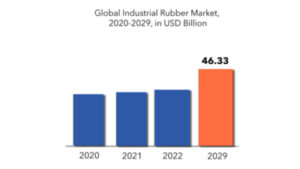Global industrial rubber market forecast to exceed $46 billion by 2029
Pune, India – The global industrial rubber market is expected to grow at 4.6 % CAGR from 2020 to 2029. It is expected to reach above USD 46.33 billion by 2029 from USD 30.91 billion in 2020 according to Exactitude Consultancy.
Industrial rubbers are one of the most adaptable materials in modern industry, being employed in practically every discipline. Automotive, building & construction, industrial manufacturing, polymer modification, wire & cable, electrical & electronics, bitumen modification, coating, sealant, & adhesive, medical & healthcare, and other industries are all seeing increased use of industrial rubber. Rubber molded goods in industrial and domestic applications are made with industrial rubbers. Tires and tubes are one of the main consumers of rubber. Rubber is also used in matting, flooring, hoses, belts, and other products. Rubber is also used as an adhesive in a variety of products and industrial applications. Isoprene, a natural polymer found in the latex sap of different plants, is used in the industrial rubber market. Rubber is a hydrocarbon polymer that occurs naturally in the sap of a variety of plants and may also be synthesized. Synthetic rubber is manufactured artificially, whereas natural rubber is sourced from plant sap.
Additionally, the mechanical rubber industry is expected to increase significantly as China’s purchasing power improves. This type of rubber is typically found in industrial and motor vehicles. Growing automobile sales in China, as well as its prominence as an automotive manufacturing hub, are projected to propel the industry forward. The global industrial rubber market is predicted to be driven by rising household wealth in emerging nations, a lack of suitable public infrastructure, and a shift in preference for private autos. Construction activity in emerging economies is also a major driver of the industrial rubber market’s growth. Various Asian governments are investing in both public and commercial infrastructure projects in nations such as India and China.
Due to well-targeted R&D, the natural rubber business is also growing. Agronomic research, physics, chemistry, and the automotive sector all participate in these operations to promote and expand the usage of natural rubber. Catheters, adhesives, balloons, elastic thread, and adhesives are all made of natural rubber latex. In the automotive industry, it is also utilized in tyres and other components of bikes, vehicles, and trucks. Natural rubber’s increasing application in the automotive, chemical, medicinal, and other industries is propelling the industry forward.
The global industrial rubber market is segmented based on type, application. By type, the market is bifurcated into synthetic rubber, natural rubber. During the projected period, synthetic rubber is expected to be the most popular form of industrial rubber. The widespread use of synthetic rubber in various applications is responsible for the segment’s growth. Synthetic rubber is widely utilized in the automotive industry as an abrasion-resistant alternative to natural rubber. In carpet manufacture, latex-based synthetic rubber is utilized as a rubbery glue. Drive couplings, haul-off pads, conveyor belts, adhesives, roll coverings, and a variety of other molded rubber goods are among the additional uses for synthetic rubber.
By application, the market is divided into automotive, building & construction, industrial manufacturing, polymer modification, others. In terms of value, the automotive industry is predicted to be the largest application segment of the industrial rubber market. Industrial rubbers are also replacing other materials in a variety of applications due to their rigidity and abrasion resistance, making them appropriate for metal, glass, and wood parts used in automotive and other industrial applications. Synthetic rubber is the most often used type of industrial rubber in the automobile industry due to its ease of manufacturing and superior performance.
The industrial rubber market key players include Sinopec Corporation, Lg Chem Ltd., The Goodyear Tire & Rubber Company, Toyo Tire & Rubber Co., Ltd., Bridgestone Corporation, Lotte Chemical Corporation, Arkema S.A., Braskem S.A., Celanese Corporation, United Rubber Industries India Private Limited
For corporate expansion, these key leaders are implementing strategic formulations such as new product development and commercialization, commercial expansion, and distribution agreements. Moreover, these participants are substantially spending in product development, which is fueling revenue generation.

